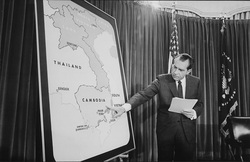

|
We gradually become historical if we live long enough, and the things everybody knows become rare and arcane. Take margarine for example. I remember as a child in the 1950s helping my grandmother clean out an old kitchen cabinet, and among the oddities in the cabinet were tiny, dusty packets of reddish-yellow dye. These, Grandma explained, were for making margarine yellow during the war, when butter was less readily available. At some point everyone must have known about this. At this point only vintage margarine-fanciers or industrial historians specializing in edible dyes are left to uphold the truth, assuming they want to. The Christmas season always includes a classic example of the way things everybody knows become things everybody forgets: the Roman census in the Gospel of Luke. Though featured on countless Christmas cards, the description of the census in Luke 2:1-7 corresponds to no known form of Roman census-taking and appears to scramble the reigns of two different governors. Maybe the Gospel writer mainly intended this to be a metaphorical account, but the simpler reading is that the writer no longer remembered what everybody used to know--how Roman administration worked in the old days before the revolt. This would be like us forgetting how the I.R.S. works or what a W-2 is, but our descendents will in fact not know about those things someday because nothing is forever, not even death and taxes. In this sense Luke 2:1-7 has great lessons for writers. The lessons are, first, we've forgotten more than we probably ever knew in the first place, and second, come to think of it, not many people notice or care very much. Such lessons are on my mind lately because I'm working on an old novel that I started in 1971. It's older than some cuneiform, I believe, but it wasn't always old. In its original form it was a day-by-day account of some events in 1970-1971. It was then called Fission and I finished the first complete draft, a novelette maybe 79 pages long, in 1975, I believe. The second complete draft, which I renamed Astral Bodies, was about 130 pages long, and I must have finished it in the very early 1980s although I don't have any actual memory of that. I do remember that I submitted it to various publishers, which involved making copies, stuffing envelopes, adding stamps, but I have no recollection of the precise details--like Roman taxation, it's a little hard to reconstruct the ancient ways.  In the years since, I assumed that somewhere around here was an old cigar box with my archives in it and among the precious litter inside there would be Astral Bodies, like a time capsule I'd left for myself to find and marvel at in a later age of the world. Earlier this year I decided to look and see, and what I found instead was a single typed copy of Astral Bodies that was 285 pages long, secured in a Japanese manuscript protector by a rotten rubber band, along with a copy of my submission letter to Ballantine Books dated 1985. This was twice as long as the draft I remembered and of inexplicable date. Also, horribly, it wasn't very good; I would say my thirty something self, who wrote the 1985 version, must have been deliberately trying to lengthen the book, always a bad idea. The primary or time-capsule draft I had wanted to see appeared to be as nonexistent as the first draft of Luke’s Gospel. I emailed some folks about this and my son Alex replied that he had what might be a different draft. He located his and sent it to me. Going by the Cottonwood Avenue address on the title page, this was a 1987 draft and it had been significantly rewritten since 1985. Odd as it was to realize that I had redrafted a novel (and submitted it for publication) and then completely forgotten that I had done so, it was even odder to discover that I had done that twice--with the same novel. I remain slightly disappointed. I would have liked to see the old 1970s version, which I had pounded out manually on a lovely antique (well, actually new then) baby blue Hermes typewriter with a French keyboard whose first row had AZERTY instead of QWERTY. So I haven't forgotten everything. But, like Lincoln's corpse, I guess the original draft now belongs to the ages.  I am now in the process of rewriting Astral Bodies as a historical novel. I don't know about the title, it sounds a little British somehow, and I can’t remember how I came by it. I may ultimately find a different one. This workable draft is awash with details of the early seventies, most of which I derived from being there. The world I’m describing is different from the popular images of the seventies we have in 2013. In some ways we know more now. In some ways what we think we know is sure to be wrong. Meanwhile, I find myself facing the paradox of my own faulty memory. I still remember Nixon's Cambodia speech but in my modern memory he uses a pointer with the famous map. In Astral Bodies he taps the map with his hand. And was there really a Bewitched rerun on TV before the Cambodia address to the nation? I will have to go to the library hat in hand and dive through the microfiche to find out whether that was witness or invention. If I had managed to retain the 1970's eyewitness draft, I think I would have had to keep faith with it. I would have owed primacy to the first account, and perhaps I could even have glimpsed my own lost self of that bygone time: reckless, impulsive, arrogant, cruel, like a Mr. Rochester without the dog, the horse, Thornton Hall, any money, any past, or any secrets; or like a Heathcliff who just would not shut up. Instead, in unearthing my eighties drafts I found relicts of a self ten years on from then, an optimistic, foolish, crafty, not too bright father of four. Not who I was looking for at all.
4 Comments
Chrissy
12/30/2013 12:21:54 am
Loved your new update! It is amazing how we continuously rediscover our younger selves through tons of different methods! Looking forward to getting your new book when it's published! Wondering if the name will remain...Anyway, how many different types or dialects of Cuneiform were there? lol Really enjoyed it!
Reply
12/31/2013 05:34:03 am
1973 was the best year ever, I remember it well. Everything else is fuzzy.
Reply
pat matsueda
1/3/2014 04:33:16 am
Interesting to discover that there's more than one memory lane, eh? One can go down one lane, thinking it is the only one, and discover things remembered are not there. Down another lane, one finds them but discover other things are missing.
Reply
Leave a Reply. |
AuthorGary Dale Mawyer, a Central Virginia native, has over 40 years of publishing and editing experience and lives with his wife Karen and two cats in Albemarle County. Sites I likeafroculinaria.com/
largea.wordpress.com/livinglisteningandthingsilove naturalpresencearts.com/ someperfectfuture.com Archives
July 2024
|